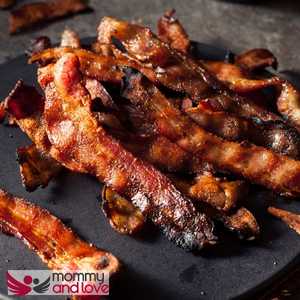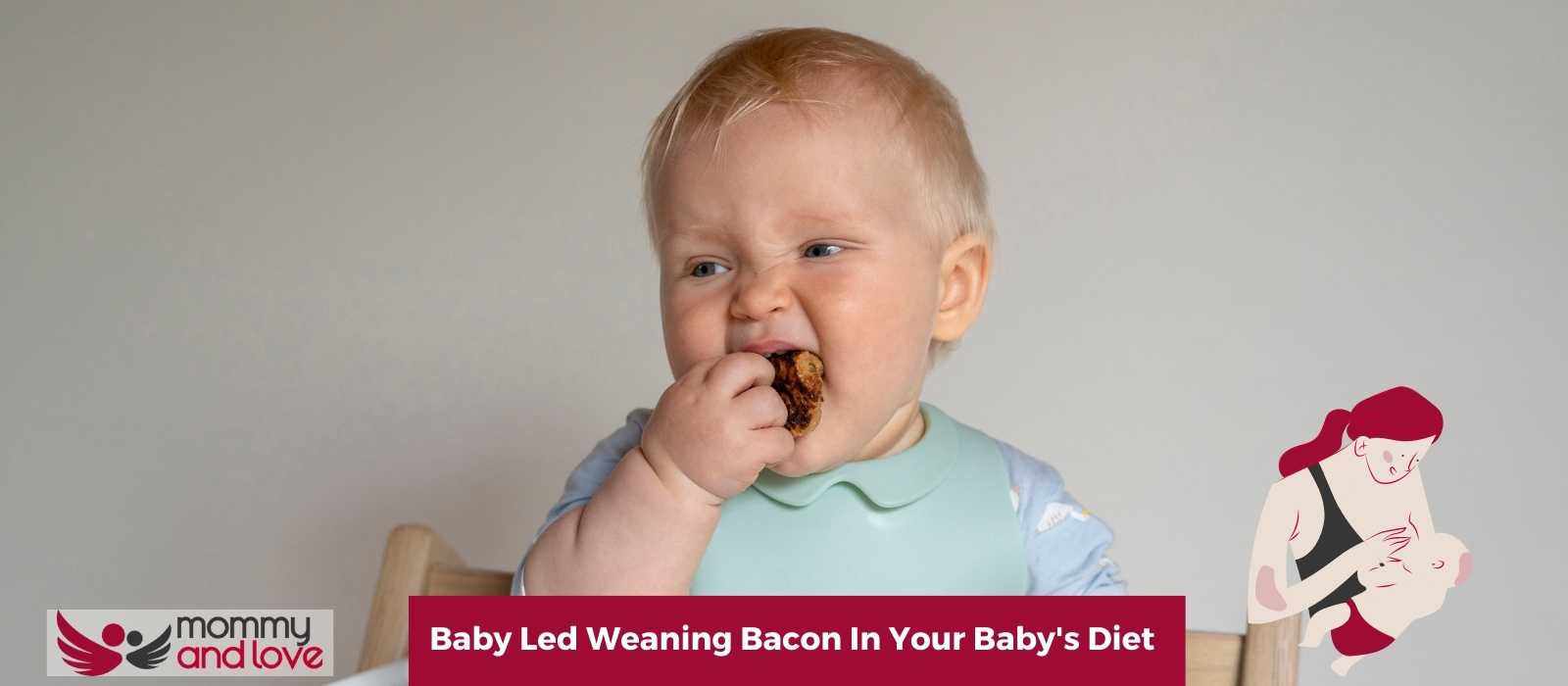Introducing bacon into your baby’s diet can be a bit daunting, but it is definitely possible with baby-led weaning. There are a few things you need to keep in mind when giving your little one this salty treat. In this blog post, we will discuss the best way to introduce bacon into your baby’s diet, as well as some of the benefits of doing so!
Is Bacon Healthy?

Bacon is not a healthy food for adults because it’s full of sodium and saturated fat. That’s true whether it is cooked at home or purchased at the store.
The same holds true for babies. Much like other preserved pork products and certain foods, such as ham and sausage, bacon is loaded with sodium, added preservatives, and saturated fat which is not healthy for babies.
Too much high-sodium foods can affect heart health and blood pressure in adults; it can also be harmful to most babies as well.
Benefits of Adding Pork Bacon to Your Baby’s Diet
Pork bacon is a great source of protein and fat for babies, but it should be introduced only when they’re developmentally ready to handle solids because it is considered a high salt food.
The American Academy of Pediatrics (AAP) recommends waiting until 6 months to introduce solids, and even then advises that parents stick with single-ingredient foods and delay combining ingredients until 8 months. Since it contains several types of meat, it’s not recommended for babies younger than 12 months.
At 12 months, babies who are ready for pork bacon can eat it in small amounts, either as finger food or crumbled into other foods. Give them just a few bites at first, since new foods can sometimes cause upset stomachs. If they have no negative reaction and seem to enjoy the taste, you can increase the amount over time.
Additional Protein Sources for Babies
Babies don’t need a lot of protein. Although it’s true that it helps build muscles, babies get enough protein from breast milk or formula to support early growth.
That said, there are plenty of alternatives to bacon as a source of protein for your baby’s diet:
Meats and Poultry
Cooked ground beef, chicken, turkey and other meats are easy for babies to digest. Start with small amounts and gradually increase the quantity.
Eggs
Hard-boiled eggs are an excellent source of protein for babies because they’re easy to digest and soft enough to blend into a smooth puree.
Fish
Fish is an excellent source of protein for babies, but avoid fish with high levels of mercury, such as swordfish, tilefish and king mackerel. Shrimp is a good option because it’s low in mercury, easy to prepare and widely available in stores.
What Are the Risks of Introducing Bacon to a Baby?
There are a few risks associated with introducing bacon to a baby’s diet. As mentioned earlier, it is high in sodium which can be harmful to a baby’s health. Babies should avoid salty foods and instead should have a well-balanced diet.
It also has food additives such as nitrates and nitrites which are known carcinogens. Studies have shown that nitrates and nitrites are far more dangerous when consumed by infants than adults. Nitrates and nitrites may also interfere with a baby’s body to absorb iron from food. This can lead to a form of anemia called methemoglobinemia.
In addition, some babies may have an allergic reaction to the meat in bacon. If your baby has any food allergies, it’s important to speak with your pediatrician before giving them any type of pork.
Finally, undercooked bacon can lead to food poisoning.
When Can Babies Eat Bacon?

Most pediatricians will tell you to wait until your baby’s first birthday before introducing bacon to her or his diet. And even then, limit consumption of bacon.
Bacon is high in salt (sodium) and fat, which can be problematic for babies younger than 12 months because their kidneys are immature and still developing.
While sodium is an important nutrient, too much of it can throw off the delicate electrolyte balance.
How to Prepare Bacon for Your Baby
Whether you’ve been cooking bacon for years, or this is your first time ever cooking bacon, follow these few steps to get the perfectly prepare bacon. It’s easier than you think!
- Use a rimmed baking sheet when you cook bacon so that all the bacon fat doesn’t run off of the pan and onto my oven floor. All of us do not like a messy oven, do we?
- In order for your bacon to cook evenly and not curl up, it’s best to lay out the bacon so it’s in one layer without any overlap. If you have a lot of pieces of bacon, use two baking sheets. You will get perfectly flat crispy pieces every single time!
- You can also bake bacon if you don’t want to fry it. Preheat your oven while you’re laying out your bacon on the baking sheet/s. That way it’s ready to go into the oven right away.
- Sliced thin and cooked until very crispy, this chewy bacon can be held by the baby and gummed until it is soft.
How Much Bacon Should Your Baby Eat?
If you’re comfortable with it, you can start feeding your baby small amounts of bacon at around six months old. Babies typically have an iron store that lasts until about 12 months old, so if your baby is eating other protein sources and food that provide key nutrients, there’s no need to wait until then to introduce bacon. Just make sure to monitor your baby for any allergic reactions and to feed them in moderation.
Cooked bacon is a high-fat, high-sodium food, so it’s best to serve it as part of a balanced diet that includes fruits, vegetables and other protein sources. Too much bacon can lead to weight gain and health problems down the road, so be sure to give your baby a variety of foods to ensure they’re getting the nutrients they need. Avoid fatty cuts and those that have added preservatives.
Every baby is different and will progress at their own pace. Some babies will be ready for bacon sooner than others. Just follow your baby’s cues and let them lead the way! Add meat to your baby’s menu when they are ready.
Is Bacon OK for Babies with Nut Allergies?
Babies with nut allergies can eat bacon. But it’s ultimately up to the parents to decide if their baby can have it. If your baby has any other food allergies, be sure to speak with your pediatrician or a health professional before giving them any type of pork.
Most pediatricians will tell you to wait until your baby’s first birthday before they can eat bacon. And even then, serve bacon in small amounts only. Bacon is high in salt (sodium) and fat, if introduced early it can be problematic for babies younger than 12 months because their kidneys are immature and still developing.
Take Away on Bacon for Babies With Baby-Led Weaning
Baby Led Weaning, or the process of introducing solid finger foods to your baby instead of relying on formula or breast milk can be a great way to help them develop healthy eating habits early on. Most babies should be getting most of her nutrition and essential nutrients from breast milk or infant formula.
While there are many different foods that you can introduce as part of this process, bacon is not typically one of them. That’s because other processed meats contain nitrates and other additives that are used in curing pork. These foods can be harmful to many babies.
Wait until your baby reaches at least 12 months old before they can eat bacon. If you want to start introducing solid foods earlier than that, consider giving your child alternative protein-rich foods like fortified baby cereal, eggs, yogurt, or cream cheese instead.

This article was written by Sandra Baker – full time writer and the mother of four amazing kids (including twins!)
She’s also a breastfeeding counselor and has spent years helping new parents learn how to care for their children. When she’s not writing or caring for her children, Sandra likes to spend time reading and taking walks with her husband.




